Tags
Related Posts
Share This
NMSA Theater
It is opening night, the house is open, and the set is not even finished. The director is exasperated. His stage manager informs him that the set was not finished because they “ran out of money.”
“You finally get used to one way of doing things and they up and change all of the rules on you,” he exclaims.
His writer, who is pacing the stage with loud nervous high-heeled clicks, turns on him. “There are no rules in art!” she shrieks, sounding half-insulted and half-horrified.
The two are interrupted by their stage manager, who is trying to delicately remove them from the stage so that their play can commence. “There shouldn’t be,” she says, “but those days are past.” She shoos them off stage, the house lights dim, and the play within the play Gun Shy is finally allowed to begin.
Gun Shy is a comedy written and directed by Joey Chavez, and performed by high school theater students at the Santa Fe charter school New Mexico School for the Arts. The play breaks the third wall and brings up questions about what constitutes art, and what is or isn’t allowable in art, over and over again. The answers to these questions, however, are perhaps more apparent in the people behind the play than the script itself.
Before their performance, the cast paced, stretched, and applied last minute make-up or costume touch-ups while practicing a few last line-throughs—reciting their lines in order without blocking or acting through the entire play. Their director and teacher Joey Chavez entered the room intermittently and watched them intently, without interrupting the focus coursing through his students.
Cris Lannucci, an NMSA senior who plays the author of the play within the play, is eager to sit for an interview, even while the line-through continues. “Don’t worry,” she says, “I don’t have a lot of lines,” before interrupting herself to contribute one of these ‘few lines’ to the reciting of the script going on around us.
This ability to multi-task and still remain focused is key for anybody interested in pursuing theater. Lanucci who plans on attending the Santa Fe University of Art and Design for theatre once she graduates, explains that she grew up with a mother who was a nurse and a father who was a U.S. Marshal, in a household swarming with a very loud Italian family.
“Acting,” she says, “was partly a way to break the tension in such a serious household, but was also the only way to get attention with all of that loud family around—I had an audience.”
Lanucci explains pragmatically that she would like to attend SFUAD because it is an affordable option, and because she knows that her education and that the confidence-building will be important to her as a young actress—flashy locations such as New York City or Los Angeles will come later. She pauses to shout another one of her lines to her fellow actors, keeping track of the line-through as she explains her relationship to the theater with her eyes absolutely shining. Another important aspect of the acting world, she explains, is versatility. She would love to go into film, but she absolutely understands the need to be able to work as a techie or a stage manager, a writer or a director, and to be proficient in both the film and the theater world, in order to make it as an actress.
Joey Chavez, who spent seven years in Atlanta and five in New York as an active participant of the theater world, knows all about the necessity of having multiple skill sets and being able to multi-task without losing focus. The night’s show is, in fact, a script that he “pulled out of the trunk”—he wrote it in the early 90’s, and recrafted it with his cast this year. The play is one of thirty that Chavez puts on annually, overseeing all aspects of the production that his ‘company’ of students put on.
“That’s just the way it is,” he says, “you have to be able to write, direct and act. That’s what it means to be a part of a theater company.”
Chavez had considered pursuing architecture as an undergrad at the University of New Mexico, but in the end, he explains, acting was the thing that he could keep on doing without it seeming like work. The integration of the other aspects of theater were less of a compromise and more of a natural component of the theater world.
The straightforwardness with which Chavez approaches this fact is mirrored by the enthusiasm of his students. When he announces backstage that the show opens in 18 minutes, a few of them make their way over to him for last minute consultations, the final minutes of pre-show excitement sinking in. Lannuci fans her armpits while talking to Chavez, exclaiming, “Only 18 minutes!?” Mr. Chavez asserts the one rule that is essential at this moment, saying calmly: “Focus, focus, focus.”
But the pre-show nervousness (which Chavez asserts never goes away), and the necessity of reeling it in, extends beyond the backstage preparations of the actors. Out in the house, where parents and friends mingle, Jesse Koehler, another senior in the theater department, fiddles at the sound-box, adjusting the background music. Chavez approaches him to give him a heads up—the show is about to start—and he is immediately serious about his job. He rushes backstage to give the actors their 10-minute warning, and then returns to the sound-box to begin his final preparations for the show.
“I love doing tech-work,” explains Koehler, “because I’m used to being onstage as an actor, and so this way I feel like I’m there for them.” Still, the nerves are even worse. “If the sound techie messes up,” Jesse says, “he screws up everybody—not just the next person to say their line in the play. Everyone is relying on you.”
The assistant director, Brenna O’Brien, who is a junior in the theater department, is also nervous, even though she has no direct role to play in the evening’s performance.
“The last performance of the show,” she explains to me, “was at a statewide competition in Portalis, New Mexico, and the whole set-up was different. It’s a different kind of stage, a different room that they performed in, and the energy is different—it circles back around to the stage. Our stage here is just in this huge room that used to be a gym, so the energy just goes out and out and the actors never feel it coming back. The play is good, Chav is a great director, and the actors know their parts, but honestly, when they did the dress rehearsal last night the whole thing just felt flat. Chav and I just looked at each other, because there’s nothing we can do about that,” she explains pragmatically.
But as the audience settles down for a raffle before the show, it becomes clear that the determination that Chavez has instilled in his students has paid off.
Koehler leaves the sound box to announce the first round of raffle winners with the enthusiasm and flamboyance of an actor who is not only very centered, but also carries himself with the confidence that comes from a director who believes in him.
“This prize is a free trip to the Squeaky Clean Car Wash!” he announces theatrically. “And here’s the surprise… it was donated by… SQUEAKY CLEAN! Thank you, Squeaky Clean!!”
Finally the show begins, with Chavez’s students playing an acting company preparing for their show. The stage manager, played by Gioia Berlin, futzes about, taking care of last-minute details, while the writer—Lanucci—cl- acks her heels across the unfinished set nervously. The director, played by Antonio Cisneros, shows up with flowers for the writer, wondering why the rules of the theater are changing on him. The writer rebukes him. “There are no rules in the theater!” she exclaims.
The show within the show begins, and the NMSA students don their secondary roles with buoyant confidence, the audience returning their energy with roars of laughter. The show progresses, and it is clear that the students have learned from their director which rules really are important to learn and master: focus, confidence, and versatility.






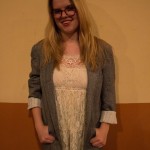
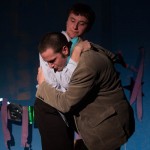


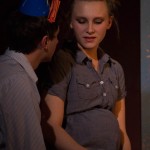

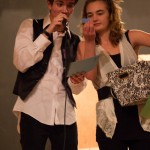


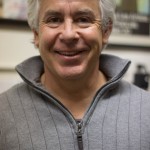
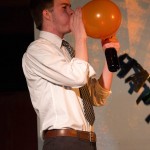

 Jackalope Magazine is the student magazine of Santa Fe University of Art and Design. Building on the interdisciplinary nature of our education, we aim to showcase the talent of our university and character of our city.
Jackalope Magazine is the student magazine of Santa Fe University of Art and Design. Building on the interdisciplinary nature of our education, we aim to showcase the talent of our university and character of our city.